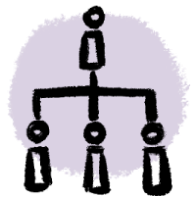
WHAT IS THE CHARTER
The NYC Charter is the foundation of how our City functions and governs, and it has a direct impact on the way we live and work.
The NYC Charter
The NYC Charter, or the City’s constitution, defines the organization, powers, functions, and essential procedures of City government, from elected officials to the budgeting process. Learn more about the NYC Charter to discover how the City is governed, and how it impacts you.
The charter is divided into three sections:

Instructions and descriptions of the City’s elected officials

Key government operations and processes

City agencies, their organization, powers and duties
Why It Matters
While the NYC Charter is an important roadmap that guides all aspects of government services, it does not ensure equity or fairness in the design or delivery of those services.The Commission is examining the NYC Charter to identify barriers to power, access, and opportunity for Black, Indigenous, Latinx, Asian, Pacific Islander, Middle Eastern, and all People of Color in New York City and will put forward ballot proposals aimed at removing those barriers and advancing racial equity
Even while the City has made great strides in meaningfully addressing inequitable outcomes through changes in policy and investment of resources, many features of the inequitable design of the system remain, highlighting for the Commission the necessity and urgency of our work.
The NYC Charter impacts the way we live and work:
How Do We Change It?
The New York City Charter is the document that defines the organization, powers, functions and essential procedures of the City government. It lays out the fundamental structure of our city’s government, controls how decisions are made, and details the budgeting process for city services and capital projects in all areas, from housing and education to human rights and emergency services.
In November 2022, New Yorkers will have a chance to vote on ballot proposals put forth by the Racial Justice Commission which will revise the NYC Charter to address the underlying causes of racial injustice and advance racial equity in our city.
“This city, and this nation, are faced with an unprecedented opportunity to think big – not just about policy changes at the margins of civic life, but about the way government is structured entirely.”
Darrick Hamilton, Institute on Race and Political Economy at The New School and member of the Racial Justice Commission